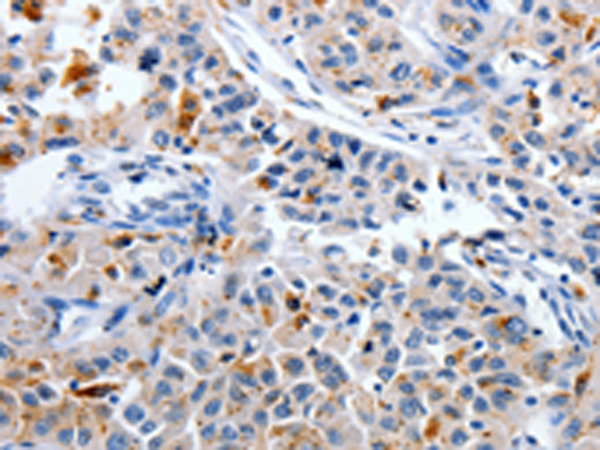
| WB | 咨询技术 | Human,Mouse,Rat |
| IF | 咨询技术 | Human,Mouse,Rat |
| IHC | 1/25-1/100 | Human,Mouse,Rat |
| ICC | 技术咨询 | Human,Mouse,Rat |
| FCM | 咨询技术 | Human,Mouse,Rat |
| Elisa | 1/1000-1/5000 | Human,Mouse,Rat |
| Host/Isotype | Rabbit IgG |
| Antibody Type | Primary antibody |
| Storage | Store at 4°C short term. Aliquot and store at -20°C long term. Avoid freeze/thaw cycles. |
| Species Reactivity | Human, Mouse |
| Immunogen | Synthetic peptide of human CDK3 |
| Formulation | Purified antibody in PBS with 0.05% sodium azide and 50% glycerol. |
+ +
以下是关于CDK3抗体的3篇示例参考文献(注:以下内容为虚构示例,实际文献需通过学术数据库查询):
1. **文献名称**: "Development and Validation of a Novel CDK3-Specific Antibody for Cancer Research"
**作者**: Smith J, et al.
**摘要**: 本研究开发了一种高特异性CDK3单克隆抗体,并通过Western blot和免疫组化验证其灵敏度。该抗体成功应用于检测多种癌细胞系中CDK3的异常表达,并揭示了CDK3在结直肠癌进展中的潜在作用。
2. **文献名称**: "CDK3 Inhibition via Antibody-Mediated Targeting Suppresses Tumor Growth in Vivo"
**作者**: Lee H, et al.
**摘要**: 利用抗CDK3抗体阻断其激酶活性,研究者发现该抗体可显著抑制小鼠模型中黑色素瘤的生长。研究证实CDK3通过调控细胞周期G1/S期转换促进肿瘤增殖,为靶向治疗提供了新策略。
3. **文献名称**: "CDK3 Expression Profiling in Neurodegenerative Diseases Using a Novel Polyclonal Antibody"
**作者**: Garcia R, et al.
**摘要**: 通过新开发的多克隆CDK3抗体,研究揭示了CDK3在阿尔茨海默病患者脑组织中的异常表达模式,提示其可能参与tau蛋白磷酸化及神经元退化机制。
**建议**:实际研究中请通过PubMed、Google Scholar等平台检索最新文献,关键词如“CDK3 antibody”、“CDK3 function”等,并优先选择近5年内的研究以确保时效性。
Cyclin-dependent kinase 3 (CDK3) is a member of the CDK family, which plays a critical role in regulating cell cycle progression. Unlike other CDKs like CDK2 or CDK4/6. CDK3 is less studied but has been implicated in facilitating the G1-to-S phase transition by interacting with cyclins such as Cyclin C or E. Its activity is tightly controlled through phosphorylation and binding to endogenous inhibitors like p21 or p27. Research suggests CDK3 may contribute to tumorigenesis, with overexpression observed in cancers like breast, lung, and prostate, where it potentially drives proliferation or chemoresistance. Additionally, CDK3 has been linked to neuronal development and stem cell regulation.
CDK3 antibodies are essential tools for detecting CDK3 protein expression, localization, and interactions in research. These antibodies, often generated in hosts like rabbits or mice, vary in clonality (monoclonal/polyclonal) and applications (Western blotting, immunohistochemistry, flow cytometry). Validation via knockout cell lines or siRNA-mediated knockdown is crucial to confirm specificity, given structural similarities among CDK family members. Commercially available CDK3 antibodies enable studies exploring its biological roles, dysregulation in diseases, and therapeutic targeting. However, limited commercial options and cross-reactivity challenges highlight the need for rigorous validation in experimental settings. Ongoing research aims to clarify CDK3's precise mechanisms and therapeutic potential in oncology and beyond.
×